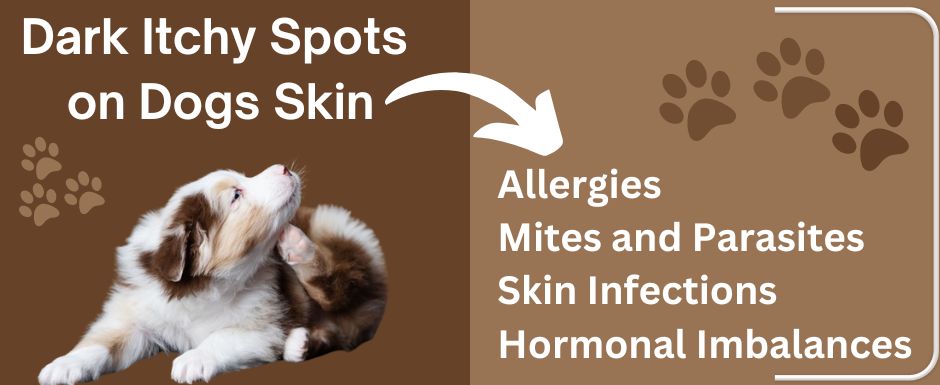Noticing dark itchy spots on dogs skin can be alarming. It’s natural to worry about the causes and how to help your huge fluffy dogs find relief. While this can be a symptom of several conditions, the good news is that there are often effective treatments available.
This blog will delve into the potential causes of dark itchy spots on dogs skin, including:
- Allergies
- Mites and parasites
- Skin infections
- Hormonal imbalances
- Other less common causes
We’ll also discuss signs to watch for, diagnostic steps, and treatment options. However, remember that this information is not a substitute for professional vet care or advice.
If your dog is experiencing dark, itchy spots, a vet visit is crucial for an accurate diagnosis and proper treatment plan, even if you have big white dogs on which you can easily find the spots.
More: Learn about Dog Ear Polyps.
Understanding Dark Itchy Spots: It’s All About Inflammation
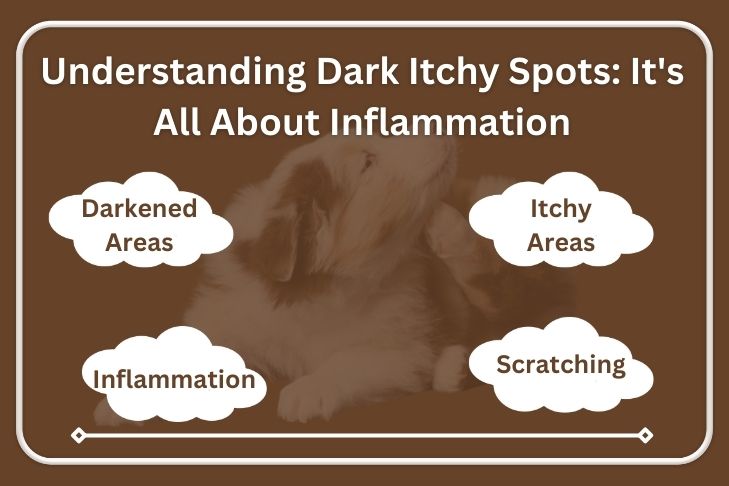
The darkened and itchy areas on your dog’s skin are often a sign of inflammation. This inflammation can stem from various causes, but it essentially means the body’s immune system is in overdrive trying to fight something off.
This can lead to increased melanin production (the pigment that gives skin its color), causing a darkened appearance. Itching arises from the body’s attempt to remove the irritant or source of inflammation. Unfortunately, scratching can worsen the problem for your chunky dog, leading to further irritation and even infection.
Common Causes of Dark Itchy Spots on Dogs
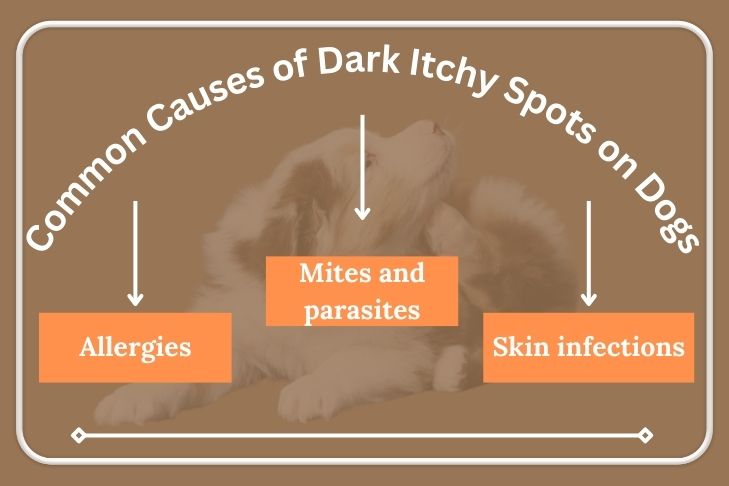
Several culprits can be behind those pesky, dark itchy spots. Let’s look at some very common ones:
- Allergies
Like humans, dogs can suffer from allergies to various things, including food, pollen, dust mites, and flea bites. These allergies can manifest as itchy, inflamed skin, sometimes with darkened areas.
- Mites and parasites
Mites like sarcoptic mange (canine scabies) burrow into the skin, causing intense itching and irritation. Fleas and ticks can also contribute to itchy spots, especially if your dog has a flea allergy.
- Skin infections
Bacterial or yeast infections can take root on your dog’s skin, leading to redness, inflammation, and itching. Often, these infections develop in areas with existing irritation or breaks in the skin barrier.
- Hormonal imbalances
Conditions like hypothyroidism (underactive thyroid) can cause hair loss, thickened skin, and darkening, sometimes accompanied by itching.
Less Common Causes of Dark Itchy Spots
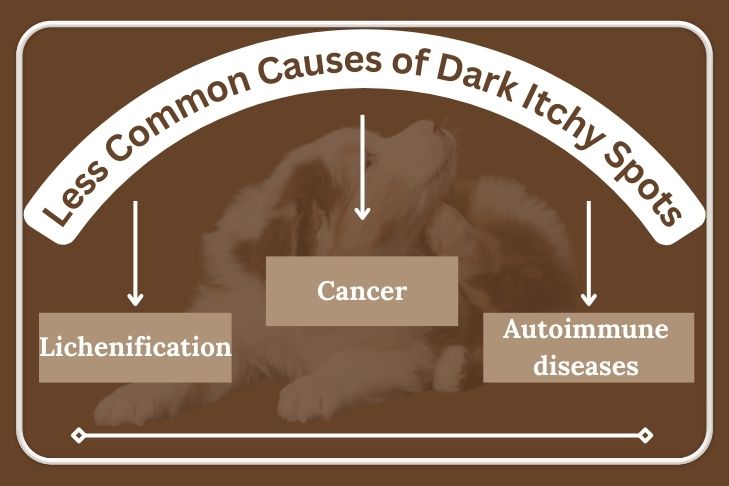
While less frequent, other factors can also contribute to dark, itchy spots:
Latensification
This is a thickening of the skin due to chronic irritation. It can appear as dark, rough patches often seen on the belly, legs, or around the tail of your fluffy dogs.
Autoimmune Diseases
In rare cases, autoimmune diseases like lupus can cause skin problems, including dark itchy spots.
Cancer
While uncommon, certain types of skin tumors can present as dark, itchy lesions.
Other diseases like dog mouth ulcers do impact puppy’s health. Check for more information
Recognizing the Signs: When to See a Vet
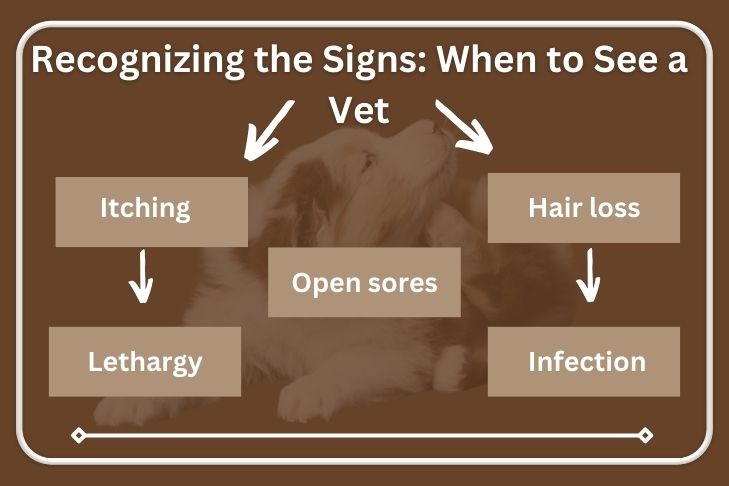
While some mild itching might not warrant immediate concern, specific signs indicate it’s time for a vet visit:
- Intense itching: If your dog seems endlessly scratching and can’t find relief, it’s a strong sign of needing professional attention.
- Hair loss and bald spots: Patchy hair loss or complete baldness in areas with dark itchy spots is concerning.
- Open sores or scabs: Broken skin increases the risk of infection and needs a vet’s evaluation.
- Signs of infection: Redness, pus discharge, or a foul odor emanating from the itchy areas might indicate an infection.
- Lethargy or loss of appetite: Almost always comes from a more serious underlying issue that needs attention.
Diagnosis and Treatment
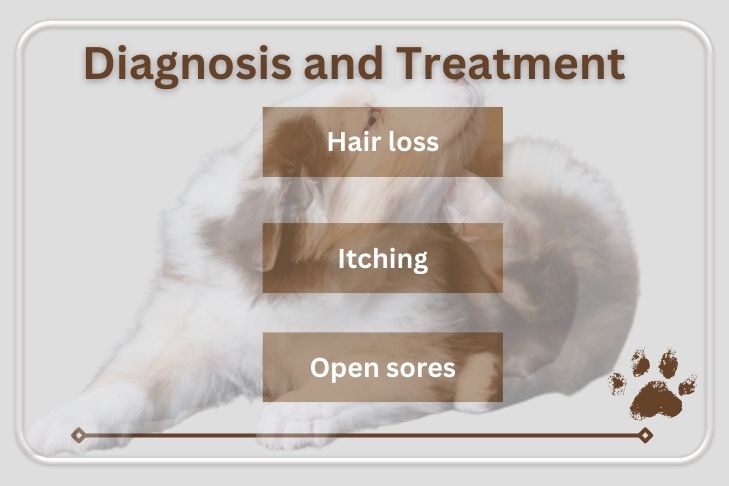
Diagnosing the cause of dark itchy spots on dogs skin often involves a combination of:
- Physical examination: Your vet will thoroughly examine your dog’s skin, looking for signs of parasites, infections, and other abnormalities.
- Skin cytology: A sample of cells from the affected area can be examined under a microscope to identify potential infections or mites.
- Blood tests: Blood work can help rule out underlying hormonal imbalances or other conditions.
Treatment will depend on the specific cause. Here’s a general overview:
- Allergies: Identifying and eliminating the allergen (if possible) is key. This might involve dietary changes, allergy medication, or flea and tick control measures.
- Mites and parasites: Antiparasitic medication will be used to eliminate the mites or parasites.
- Skin infections: Antibiotics or antifungal medication will be prescribed to fight the infection.
Final Words:
While this blog provides a general overview of potential causes and treatment approaches for dark itchy spots on your dog, remember that it cannot replace professional veterinary advice. Make sure you’re keeping your furry dogs updated on healthcare.



